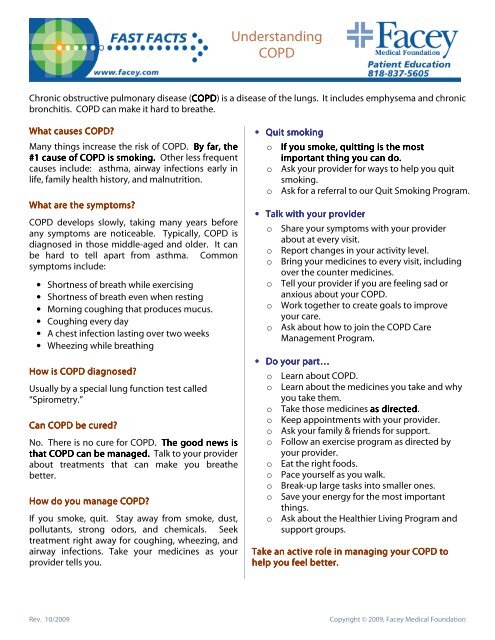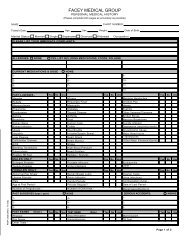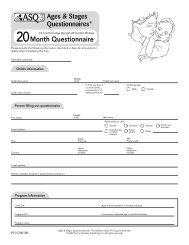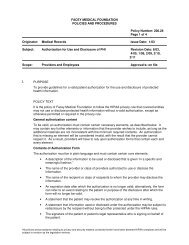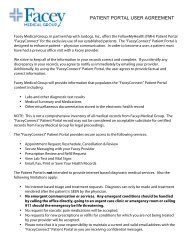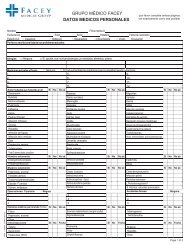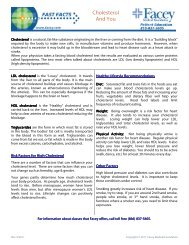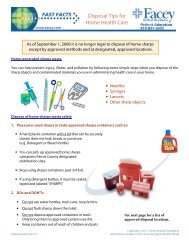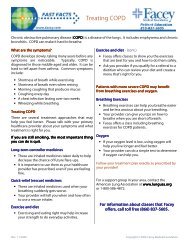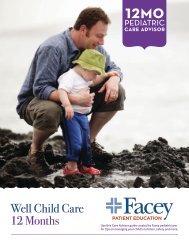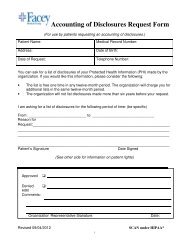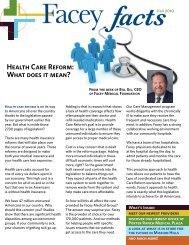Understanding COPD.pdf - Facey Medical Group
Understanding COPD.pdf - Facey Medical Group
Understanding COPD.pdf - Facey Medical Group
You also want an ePaper? Increase the reach of your titles
YUMPU automatically turns print PDFs into web optimized ePapers that Google loves.
<strong>Understanding</strong><br />
<strong>COPD</strong><br />
Chronic obstructive pulmonary disease (<strong>COPD</strong><br />
<strong>COPD</strong>) is a disease of the lungs. It includes emphysema and chronic<br />
bronchitis. <strong>COPD</strong> can make it hard to breathe.<br />
What causes <strong>COPD</strong><br />
Many things increase the risk of <strong>COPD</strong>. By far, the<br />
#1 cause of <strong>COPD</strong> is smoking. Other less frequent<br />
causes include: asthma, airway infections early in<br />
life, family health history, and malnutrition.<br />
What are the symptoms<br />
<strong>COPD</strong> develops slowly, taking many years before<br />
any symptoms are noticeable. Typically, <strong>COPD</strong> is<br />
diagnosed in those middle-aged and older. It can<br />
be hard to tell apart from asthma. Common<br />
symptoms include:<br />
• Shortness of breath while exercising<br />
• Shortness of breath even when resting<br />
• Morning coughing that produces mucus.<br />
• Coughing every day<br />
• A chest infection lasting over two weeks<br />
• Wheezing while breathing<br />
How is <strong>COPD</strong> diagnosed<br />
Usually by a special lung function test called<br />
“Spirometry.”<br />
Can <strong>COPD</strong> be cured<br />
No. There is no cure for <strong>COPD</strong>. The good news is<br />
that <strong>COPD</strong> can be managed. Talk to your provider<br />
about treatments that can make you breathe<br />
better.<br />
How do you manage <strong>COPD</strong><br />
If you smoke, quit. Stay away from smoke, dust,<br />
pollutants, strong odors, and chemicals. Seek<br />
treatment right away for coughing, wheezing, and<br />
airway infections. Take your medicines as your<br />
provider tells you.<br />
• Quit smoking<br />
o If you smoke, quitting is the most<br />
important thing you can do.<br />
o Ask your provider for ways to help you quit<br />
smoking.<br />
o Ask for a referral to our Quit Smoking Program.<br />
• Talk with your provider<br />
o Share your symptoms with your provider<br />
about at every visit.<br />
o Report changes in your activity level.<br />
o Bring your medicines to every visit, including<br />
over the counter medicines.<br />
o Tell your provider if you are feeling sad or<br />
anxious about your <strong>COPD</strong>.<br />
o Work together to create goals to improve<br />
your care.<br />
o Ask about how to join the <strong>COPD</strong> Care<br />
Management Program.<br />
• Do your part…<br />
o Learn about <strong>COPD</strong>.<br />
o Learn about the medicines you take and why<br />
you take them.<br />
o Take those medicines as directed.<br />
o Keep appointments with your provider.<br />
o Ask your family & friends for support.<br />
o Follow an exercise program as directed by<br />
your provider.<br />
o Eat the right foods.<br />
o Pace yourself as you walk.<br />
o Break-up large tasks into smaller ones.<br />
o Save your energy for the most important<br />
things.<br />
o Ask about the Healthier Living Program and<br />
support groups.<br />
Take an active role in managing your <strong>COPD</strong> to<br />
help you feel better.<br />
Rev. 10/2009<br />
Copyright © 2009, <strong>Facey</strong> <strong>Medical</strong> Foundation
<strong>COPD</strong> Office Visit Checklist<br />
Answer the following questions prior to your next medical visit and be sure to talk with your provider about<br />
your answers, and the changes since your last visit:<br />
1. Are you a smoker Yes No<br />
2. Has your breathing been more difficult than usual Yes No<br />
3. Have you been coughing more than usual Yes No<br />
4. Has this coughing produced more mucus than usual Yes No<br />
5. Has your mucus been thicker than usual Yes No<br />
6. Has the color of your mucus been different than usual Yes No<br />
7. Have you been wheezing Yes No<br />
8. Have you been awakened by your breathing Yes No<br />
9. About how many hours have you been sleeping each night Yes No<br />
10. How would you describe changes in your appetite Decreased Normal Increased<br />
11. Have you lost any weight Yes No<br />
If yes, how much have you lost<br />
12. What activities have you been regularly doing Yes No<br />
13. Are any activities harder for you because of your breathing Yes No<br />
14. Overall, is your health better, the same, or worse Yes No<br />
15. Did you use your breathing medicine today Yes No<br />
Bring all your medicines to your doctor's appointment. Talk to your doctor about how you are feeling and<br />
how you can better manage your <strong>COPD</strong>.<br />
For information about classes that <strong>Facey</strong> offers, call toll free (866) 837-5605.<br />
Rev. 10/2009<br />
Copyright © 2009, <strong>Facey</strong> <strong>Medical</strong> Foundation


